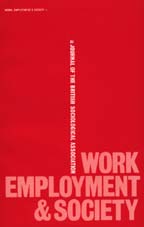Crossref Citations
This article has been cited by the following publications. This list is generated based on data provided by
Crossref.
Warren, Tracey
2003.
A Privileged Pole? Diversity in Women's Pay, Pensions and Wealth in Britain.
Gender, Work & Organization,
Vol. 10,
Issue. 5,
p.
605.
Warren, Tracey
and
Britton, Nadia Joanne
2003.
Ethnic diversity in economic wellbeing: The combined significance of income, wealth and assets levels.
Journal of Ethnic and Migration Studies,
Vol. 29,
Issue. 1,
p.
103.
Wilson, Fiona M.
2003.
Equal Pay and the Public Sector.
Public Money and Management,
Vol. 23,
Issue. 4,
p.
216.
Warren, Tracey
2004.
Working part‐time: achieving a successful ‘work‐life’ balance?1.
The British Journal of Sociology,
Vol. 55,
Issue. 1,
p.
99.
Andrews, Martyn
Bradley, Steve
and
Stott, Dave
2004.
Measuring pre‐ and post‐labour market occupational segregation using careers service data.
Journal of Education and Work,
Vol. 17,
Issue. 1,
p.
3.
Lewis, Ione
2004.
Gender and professional identity: A qualitative study of social workers practising as counsellors and psychotherapists.
Australian Social Work,
Vol. 57,
Issue. 4,
p.
394.
Smithson, Janet
Lewis, Suzan
Cooper, Cary
and
Dyer, Jackie
2004.
Flexible Working and the Gender Pay Gap in the Accountancy Profession.
Work, Employment and Society,
Vol. 18,
Issue. 1,
p.
115.
Brown, Claire
and
Jones, Liz
2004.
The Gender Structure of the Nursing Hierarchy: The Role of Human Capital.
Gender, Work & Organization,
Vol. 11,
Issue. 1,
p.
1.
Marks, Gary N.
Headey, Bruce
and
Wooden, Mark
2005.
Household wealth in Australia.
Journal of Sociology,
Vol. 41,
Issue. 1,
p.
47.
SMITHSON, Janet
2005.
‘Full-timer in a Part-time Job’: Identity Negotiation in Organizational Talk.
Feminism & Psychology,
Vol. 15,
Issue. 3,
p.
275.
Warren, Tracey
2006.
MOVING BEYOND THE GENDER WEALTH GAP: ON GENDER, CLASS, ETHNICITY, AND WEALTH INEQUALITIES IN THE UNITED KINGDOM.
Feminist Economics,
Vol. 12,
Issue. 1-2,
p.
195.
Moore, Dahlia
2006.
Why Don't They Demand More? Entitlement and Work Values of Religious and Secular Women and Men in Israel.
Journal of Applied Social Psychology,
Vol. 36,
Issue. 8,
p.
1924.
Rachman-Moore, Dalia
Almor, Tamar
and
Kogman, Meir
2006.
Equal investments, different rewards: gender inequalities among Israeli lawyers.
International Journal of the Legal Profession,
Vol. 13,
Issue. 3,
p.
189.
Denton, Margaret
and
Boos, Linda
2007.
The Gender Wealth Gap: Structural and Material Constraints and Implications for Later Life.
Journal of Women & Aging,
Vol. 19,
Issue. 3-4,
p.
105.
Barron, David Nicholas
and
West, Elizabeth
2007.
The emotional costs of caring incurred by men and women in the British labour market.
Social Science & Medicine,
Vol. 65,
Issue. 10,
p.
2160.
Gosling, Victoria K.
2008.
Regenerating Communities: Women's Experiences of Urban Regeneration.
Urban Studies,
Vol. 45,
Issue. 3,
p.
607.
Frick, Joachim R.
and
Grabka, Markus M.
2009.
Zur Entwicklung der Vermögensungleichheit in Deutschland.
Berliner Journal für Soziologie,
Vol. 19,
Issue. 4,
p.
577.
Sierminska, Eva M.
Frick, Joachim R.
and
Grabka, Markus M.
2010.
Examining the gender wealth gap.
Oxford Economic Papers,
Vol. 62,
Issue. 4,
p.
669.
Vespa, Jonathan
and
Painter, Matthew A.
2011.
Cohabitation History, Marriage, and Wealth Accumulation.
Demography,
Vol. 48,
Issue. 3,
p.
983.
Scholarios, Dora
and
Taylor, Phil
2011.
Beneath the glass ceiling: Explaining gendered role segmentation in call centres.
Human Relations,
Vol. 64,
Issue. 10,
p.
1291.


